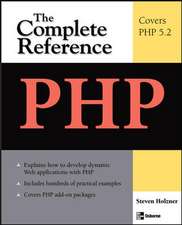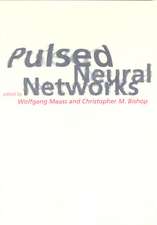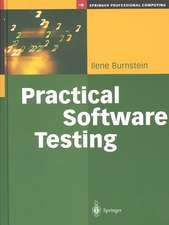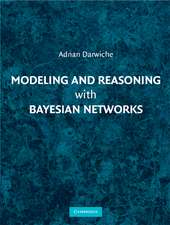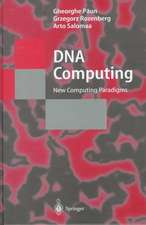Software Verification and Validation: An Engineering and Scientific Approach
Autor Marcus S. Fisheren Limba Engleză Paperback – 29 oct 2010
| Toate formatele și edițiile | Preț | Express |
|---|---|---|
| Paperback (1) | 583.12 lei 6-8 săpt. | |
| Springer Us – 29 oct 2010 | 583.12 lei 6-8 săpt. | |
| Hardback (1) | 759.80 lei 6-8 săpt. | |
| Springer Us – 27 noi 2006 | 759.80 lei 6-8 săpt. |
Preț: 583.12 lei
Preț vechi: 728.90 lei
-20% Nou
Puncte Express: 875
Preț estimativ în valută:
111.62€ • 121.28$ • 93.82£
111.62€ • 121.28$ • 93.82£
Carte tipărită la comandă
Livrare economică 21 aprilie-05 mai
Preluare comenzi: 021 569.72.76
Specificații
ISBN-13: 9781441941008
ISBN-10: 1441941002
Pagini: 184
Ilustrații: X, 172 p. 20 illus.
Dimensiuni: 155 x 235 x 10 mm
Greutate: 0.27 kg
Ediția:Softcover reprint of hardcover 1st ed. 2007
Editura: Springer Us
Colecția Springer
Locul publicării:New York, NY, United States
ISBN-10: 1441941002
Pagini: 184
Ilustrații: X, 172 p. 20 illus.
Dimensiuni: 155 x 235 x 10 mm
Greutate: 0.27 kg
Ediția:Softcover reprint of hardcover 1st ed. 2007
Editura: Springer Us
Colecția Springer
Locul publicării:New York, NY, United States
Public țintă
ResearchCuprins
Preface.- Introduction.- Managing Verification and Validation.- The Axioms of Leadership.- Planning.- Managing the Plan.- Risk Management.- Communication Structures.- Risks and Issue Management.- Communication Structures.- The Verification and Validation Life Cycle.- Traceability Analysis.- Interface Analysis.- Phase Dependent Analysis.- V&V Testing.- Systems Verification and Validation.- Index.
Recenzii
From the reviews:
"The man body of the book appears of four chapters and an appendix. … it is a very inspiring essay or monograph on V&V, written by an experienced V&V project manager. It encourages readers to look at their own projects from a fresh perspective, and gives the reader some new ideas on managing quality in his or her project. I enjoyed reading it." (Markus Wolf, Computing Reviews, January, 2008)
"The man body of the book appears of four chapters and an appendix. … it is a very inspiring essay or monograph on V&V, written by an experienced V&V project manager. It encourages readers to look at their own projects from a fresh perspective, and gives the reader some new ideas on managing quality in his or her project. I enjoyed reading it." (Markus Wolf, Computing Reviews, January, 2008)
Textul de pe ultima copertă
The World is lacking an in-depth technical book describing the methods and techniques used to provide confidence in our system software. Not only is the U.S. government more focused on software safety in today's market, but private industry and academia are as well. The methods and techniques that provide such confidence are commonly called software verification and validation.
Software Verification and Validation: An Engineering and Scientific Approach, a professional book, fills the critical need for an in-depth technical reference providing the methods and techniques for building and maintaining confidence in many varieties of system software. The intent of this volume is to help develop reliable answers to such critical questions as:
1) Are we building the right software for the need?
2) Are we building the software right?
Software Verification and Validation: An Engineering and Scientific Approach is structured for research scientists and practitioners in industry. This book is also suitable as a secondary textbook for advanced-level students in computer science and engineering.
Software Verification and Validation: An Engineering and Scientific Approach, a professional book, fills the critical need for an in-depth technical reference providing the methods and techniques for building and maintaining confidence in many varieties of system software. The intent of this volume is to help develop reliable answers to such critical questions as:
1) Are we building the right software for the need?
2) Are we building the software right?
Software Verification and Validation: An Engineering and Scientific Approach is structured for research scientists and practitioners in industry. This book is also suitable as a secondary textbook for advanced-level students in computer science and engineering.
Caracteristici
Defines the structures that need to be put in place to manage the risks and issues that are discovered over the course of a verification and validation project Defines the communication structures needed to successfully explain the technical results and concerns that the verification and validation teams have discovered

